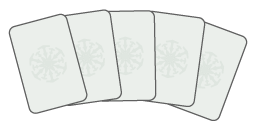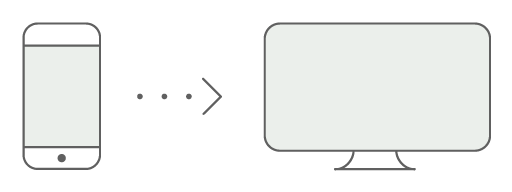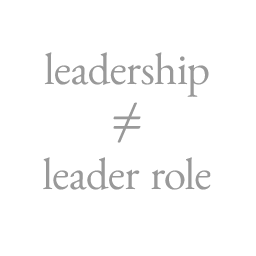It may seem unintuitive, but giving individual players more autonomy and independence from their team can actually be a positive for the presence of teamwork in a lane-pushing game.
Here's how that happens in Causeway.
Introduction
One of the design principles at the heart of Causeway and its predecessors' development was:
Individual players should have as much influence over the game's outcome as possible.
Empowering players is important, and Causeway makes an extra emphasis of empowering individual players. Every time someone joins a match, I want them to be comfortable: knowing that the means to win are in their hands.
We're not interested in securing a "good" amount of influence; this is really about chasing the as much as possible, right to the peak! To get there, we need to examine every option for improving a player's win potential.
 The Wild Cards
The Wild Cards
Most of the mechanics in lane-pushing games are pre-determined and have consistent behaviours. This leaves exactly 10 wild-cards in each match that a player might be able to influence to help them win: the players.
Let's divide them into groups, and examine how each can be influenced in our favour:
- Our own hero: We can get more value here by learning to use our hero better. There are many different areas for improvement: game knowledge, map-sense, mechanical ability, etc., which I will collectively refer to as a player's level of personal skill. Raising personal skill will net better results.
- Our team's heroes: How someone plays and communicates will affect the performance of other players on their team! There is a certain skill to doing it better, but it's informal and not something players are 'expected' to do.
- The enemy heroes: We could attempt to make the enemy team play in a way that's favourable to us by tilting them. There is a skill (or art!) to this, but as game designers it's not something we want to encourage.
We're left with two broad categories to explore: how to make the most of a player's personal skill, and how to let them make the most of their team.
Personal Skill
Personal skill already has a big impact on who wins, though there are a number of factors beyond a player's control that can dilute it:
- Ending up in a role that can't close out games
- Under-performing team-mates
- Being focused down by stuns
- Randomness of any kind
Causeway does a lot to reduce the negative impact these factors can have, and many of our design articles will address those topics in more detail. For now, suffice to say that if a player's personal skill is 8/10, the goal is for their effectiveness to more reliably be 8/10:
Allowing personal skill to shine like this is good progress towards giving individual players better influence over the game's outcome. Now, let's look to how we can influence the remaining four factors: the team.
 The Winning Formula
The Winning Formula
The "winning formula" in lane-pushing games is not a secret. Look at who wins tournaments: it isn't five people who've never met before and refuse to coordinate. The people who take home trophies play as a team.
If a player wants to maximise their win potential, then they should be doing everything possible to make their team play as a team. The closer they can get to the optimal team environment that's used to win international tournaments, the greater their chance at success.
The issue is:
...making a team play as a team is hard!
It's a challenge in business and sports environments, and it's definitely a challenge in online games too. Actually it's a much bigger challenge in lane-pushing games, because there's time constraints, limited communication tools, language barriers, differing "expert opinions" from players, poor methods of conflict resolution, and none of the team-building exercises, motivational speaking, or coaching that would be available in a professional environment.
Then we have players who just want to have fun, or are fixated on trying out their new build (as is their right to do). Involving these players won't be easy if it contradicts their existing plans.
It's no wonder that trying to influence team-mates is considered "optional". It takes sustained effort, and positive outcomes are unreliable at best.
However: the winning formula hangs in the balance. If we want to give each player the best possible tools to influence the outcome of the game, then among those tools needs to be a way to get their team to play as a team. Even when some of those players have other priorities mixed in! This is arguably the most important tool in the kit.
Passive to Active
A player's ability to unify their team is a separate skill to their personal skill. It starts with their ability to communicate, but involves a range of other skills, such as building trust, taking initiative, inspiring confidence in team-mates, keeping up morale, and accepting responsibility for mistakes.
Collectively, what we're talking about is Leadership Skills.
Unlike many of the skills that take centre-stage in discussions about lane-pushing games (drafting, farming, map-sense), leadership skills are a soft or transferable skill: a skill can be applied in many areas throughout life.
Other examples of soft skills would be self-discipline, time management, or public speaking.
In our context,
Leadership is what moves a team from working together passively, to working together actively.
Knowing that this has the potential to influence the outcome of the game, we need to expand our model to include leadership skills. Thus, we can say there are two broad categories of skills which help people win games:
- Personal Skill: Ways to maximise the value of your own character.
- Leadership Skill: Ways to maximise the value of your team's players.
We mentioned previously that Causeway makes adjustments that allow personal skills to shine. Similarly, it's a core component of our design philosophy that the game allows leadership skills to shine.
There are three great reasons to do this:
Maximising Player Agency:
By allowing players to influence all five wild-cards, individual players can actually get as much influence over the game's outcome as there is to give.
Emphasising New Skills:
Expanding the range of skills that players can credibly use and master to win the game injects new life into the genre.
- For players who are accustomed to honing their personal skill, we're offering a new avenue in which to seek improvement: one which can help to stabilise their team's performance and let their existing personal skill be more reliably effective.
- Many people are more gifted in the area of leadership skill than personal skill, and this design direction offers them a better and revitalized way to engage with the genre: in an environment where they can find success using their familiar personal strengths.
- Finally, leadership is a force that alters the direction of countries, industries, and society's values. Good leaders can bring out the best in people; bad leaders can bring frustration and ruin.
Rewarding the development of better leadership skills within players is fascinating from a human perspective.
Social Environment:
Demystifying leadership skills does a lot more than just let players improve their winrate.
Promoting and rewarding active participation in teamwork in games is a big step towards giving players a more positive and enjoyable gameplay experience, and helps battle issues like toxicity. When we elevate the status of leadership skills, we're giving proper acknowledgement those who have talent at bringing out the best in their team-mates, and encouraging them to do it more!
Even players who care nothing for getting their team involved can still be recipients of leadership, and benefit from playing in an environment where attitudes towards teamwork and working together are healthier.
The benefits we've described are nice, but actually delivering on them is another story. There are a lot of ways that leadership could be done wrong... it's a bit like game design bullet hell.
So now: lets have some reassurance that the game isn't headed in a bad direction.
 Sanity Check
Sanity Check
Probably the worst implementation of "leadership" is picking one player and giving them a special title and absurd privileges over the other players. That does not work in lane-pushing games, and directly conflicts with giving individual players the means to win. Even minor "leader roles" like squad leader or commander are something we want to avoid.
Thus:
All players in Causeway are equal; there are no special "leader" roles/privileges.
Another question that's likely to come up is: "What if I don't want to do teamwork?". To explain this, we'll use an anecdote from web design.
 Progressive Enhancement
Progressive Enhancement
When mobile devices came along, web designers were accustomed to building sites for desktop monitors. To accommodate smaller screens, they would look through their desktop features and figure out which ones could be cut so that mobile users wouldn't suffer too much. This came to be known as graceful degradation.
More recently, designers start with the mobile experience in mind, and ensure that the core experience works there. Then, they make use of the extra space as it becomes available on larger screens, building upon a core experience that already works. This is called progressive enhancement.
What the graceful degradation designer really wants is for their users to "just upgrade" and interact with the product according to their perfect vision of it.
Thankfully, Causeway doesn't do that. We use a progressive enhancement approach.
If there are no players who want to offer their leadership to their team, that's fine: the game is still a perfectly good experience. If someone does want to lead, the game will make use of that. And if everyone wants to lead and contribute to the team's direction, then the advanced teamwork mechanics really kick in. But it's not demanded of anyone, and you can absolutely win on your own. (All that personal skill stuff is still at work!)
Part of doing leadership right is respecting a player's decision to reject it! The person trying their hand at shot-calling or pinging a boss may not always be the most knowledgeable on the team.
Afterword
Leadership isn't new. Plenty of top players in their respective games understand that influencing their own team can be a big factor in victory. Our work with Causeway is to streamline the process and make it something anyone can do; ideally something many players will want to do, and find enjoyable and rewarding.
 A slightly unfortunate issue is that if a player hears about a competitive game with "leadership", they will usually assume someone gets to play dictator.
A slightly unfortunate issue is that if a player hears about a competitive game with "leadership", they will usually assume someone gets to play dictator.
That is not what happens in the game, but people understandably assume it. So we try to be careful with how we use the "L-word", to avoid confusion.
Getting leadership right has the potential to be transformative for how people perceive and experience the genre. As we've mentioned, getting teams to play as teams is a deep problem which is particularly challenging in a compeititve online environment: but to us this is the cutting edge of the genre, and we consider it the problem that's most worth my time to be working on.
Having Causeway acknowledge leadership skills is far from the only thing the game aspires to do, but it's an important pillar.
This is complicated by one of Causeway's other design pillars, which is offering players meaningful choice. The easiest way to make groups work smoothly together is to give players mechanics which (due to meta or otherwise) they're agreed on how to use efficiently. But if it's so easy for five players to agree — then it mustn't have been a very interesting choice!
Later articles will discuss the scope of these issues in more detail, as well as outlining some of the solutions we have in mind. And if those ideas don't prove to be watertight, well, we have a whole beta to figure it out. We're committed to getting this right.
Until next time,
Softmints
The Crafting Causeway series aims to introduce the features of our upcoming game, while also sharing insights about lane-pushing game design, and opening the grounds of discussion: with a view to improving the genre as a whole.
See more articles or leave a comment below.
- Log in to post comments